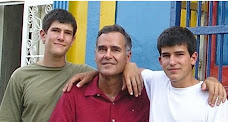 Governor Luis Reyes Reyes talks with Gaudy y Omar (on the right) about new initiatives in cooperative education and development
Governor Luis Reyes Reyes talks with Gaudy y Omar (on the right) about new initiatives in cooperative education and developmentOur friends, Gaudy Garcia and her husband, Omar, have been organizing and working in cooperatives for more than thirty years. Among other things, they helped start La Alianza Cooperative farm, a cooperative grocery shop, and the MonCar Cooperative, a women’s co-op that produces and bottles vegetables, sauces, fruits, jellies, and jams. On September 17th, the governor of Lara, Luis Reyes came to celebrate the success of cooperative and sustainable development in Monte Carmelo and the neighboring villages around Sanare.
Gaudy is one of the friendliest (and most tenacious) political organizers in the region and has traveled abroad to meet with women’s groups and organic food organizations. Through her interest in promoting proper alimentation and fair labor practices, she has also joined the international “Slow Food” alliance.
This was a big day in Monte Carmelo as political dignitaries and television reporters descended upon this little village of about 700 people. One of Chavez’s cabinet ministers joined the governor, and they both spoke with President Chavez, who was conducting his Sunday afternoon TV show, Alo Presidente. This week the show emphasized various efforts throughout Venezuela that are promoting sustainable development. Chavez praised several local efforts in the state of Lara, including Monte Carmelo and Sanare, and also presented information about a wide range of new environmental initiatives.
The Minister of Popular Power for Land and Agriculture congratulated the various local cooperatives, and especially La Alianza, for being pioneers in sustainable development and organic farming. And he came bearing gifts, in particular a valuable donation from the Tierra Fertil (“Fertile Earth”) foundation: a brand-new, three-ton Ford truck for La Alianza.
 Polilla and a fellow co-op member with their new truck (see the other posting about La Alianza
Polilla and a fellow co-op member with their new truck (see the other posting about La AlianzaPresident Chavez’s television presentations can be very informative. Besides talking about Desarrollo Endogeno Sustenible (“sustainable development within the community”), he also outlined a number of ways that Venezuela is promoting the use of energy-saving and pollution-reducing appliances and vehicles. The chart above shows how a combination of new kinds of household appliances (many of them powered by natural gas and hydroelectric power) will enable an average family to reduce its monthly utility bill from over 100,000 bolivares (about $50) to 13,800 bolivares (about $7 dollars.)

The widescreen TV is broadcasting ¨Alo Presidente¨ by satellite to the meeting outside of Monte Carmelo
Luis Reyes Reyes, Governor of Lara
The governor seems like a thoughtful and responsive man, generally liked around here, although two people told me they wished he was more dynamic and forceful in his speaking style. What they mean, I think, is “more like Chavez,” but I don’t think anyone can entertain and motivate people like the President does. The governor and I spoke briefly, and he was very supportive of the idea that students from the United States might come here for classes in organic farming and sustainable development (which was, after all, the theme of the day’s event in Monte Carmelo.)
By pure coincidence, the night before the governor came to Monte Carmelo, I was reading an interview with him that appears in the appendix of a fascinating book by the English writer Tarik Ali, Pirates of the Caribbean: the Axis of Hope (Verso, 2006 -- if you haven’t read any of his books, or the periodical he has edited for decades, The New Left Review, you should take a look some time; he’s one of the most incisive and independent left-wing essayists in the world, and a good historical novelist, too.) The interview was recorded in 2004 by Rose Elizalde and Luis Baez).
In this interview, Governor Luis Reyes Reyes speaks about being a fellow student of Hugo Chavez at the National Military Academy, graduating the same year but going into the Air Force instead of the Army. Like Chavez, Reyes Reyes came from Barinas, a poor rural area far from metropolitan Caracas, and worked his way to the top levels of the class at the academy. After rising through the ranks, he, like hundreds of other disgruntled officers, was willing to join Chavez in the failed military/civilian rebellion of 1992.
In the interview, the governor described the kind of corruption and undemocratic behavior engaged in by high-ranking officers and their government cronies. “As lieutenant, they gave me the job of picking up a ballot box in a mountain town… a colonel told me not to bother delivering it … ‘But what about those voters?’ [I asked]… ‘Pick up the ballot boxes and throw them off the plane!’”
“These were crimes that the Armed Forces participated in every day,” Reyes Reyes explained, “not to mention the overt affluence that the officers who served that political system flaunted.”
After the attempted coup, the governor was imprisoned nearly as long as Chavez, but he was released a little earlier in 1994 because his young son was dying of cancer. Following his son’s death, he decided not to follow Chavez into the political arena, but instead devoted himself to the social plight of street kids. He and his wife set up a home for homeless children on a small farm in his home state of Barinas. He did not enter politics until 1999, when Chavez asked him to head one of the government ministries. In 2000, after the constitution was rewritten, he ran for and won the governorship of Lara.












No comments:
Post a Comment